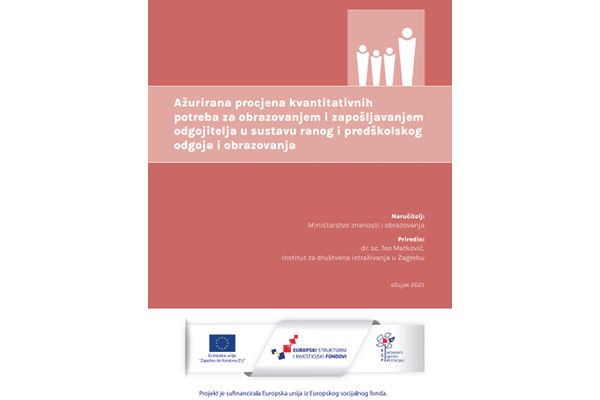Notifications list
A study on the needs for education and employment of early and pre-school educators
Published: 14.11.2023.

The Ministry of Science and Education published on its web-site a study titled “Updated assessment of quantitative needs for education and employment of early and pre-school educators“, which was conducted in 2021 by Teo Matković, of the Institute's Centre for Educational Research and Development (CERD).
Expansion of workforce is necessary for meeting the participation goal of 96% of pre-school children, as foreseen in the National Recovery and Resilience Plan, and the National Development Strategy of the Republic of Croatia until 2030. Taking into account the continuation of the expansion of nursery participation, the replacement of educators that are retiring, and the maintenance of the existing teacher-pupil standards, the study assesses that there is a need for the employment of additional 7,002 of ECEC educators in the system. The data published after the completion of the study indicates that the number of ECEC educators in kindergartens increased from 13,694 to 15,159 between 2020/21 and 2022/23, which amounts to the record 1,465 two-year increase, thus coming very close to the most ambitious modelled scenario of expansion.
Consistently, in recent years the number of unemployed early and pre-school educators has been at its record minimum, and the demand at its record peak, dropping even further from 243 to 159 in the period between May 2021 and May 2023. Based on decennial assessment of the admission quotas, realized enrolments and graduations, taking into account inflow of persons with foreign qualifications, as well as established patterns of attrition due to emigration, retirement and employment outside the profession, the study concludes that the existing number and structure of ECEC education capacities are inadequate for the quality fulfilment of this ambition. The only permanent and quality solution for this challenge is the enlargement of capacities of the regular initial higher education ECEC programmes. Nevertheless, in the three years since the completion of the study, i.e. between the enrolment year 2020/21 and 2023/24, the admission quotas of all higher education institutions increased by only 10 admission places (from 930 to 940). Moreover, about one half (470) of placements remained allocated for the unpopular paid part-time studies that increasingly struggle to attract and enrol students. In the absence of enlargement of regular study capacities in the past two years, an opportunity to increase the inflow of highly qualified ECEC educators to the labour market was postponed at least until 2027. This has aggravated the continuation of quality expansion of the ECEC system, which is increasingly relying on provisional solutions.
